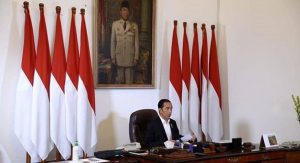In Indonesia, the tradition of mudik refers to the mass migration of Islamic transmigrants returning to their ancestral villages and hometowns for Eid al-Fitr. The sheer scale of this mass movement of people is monumental, with an estimated 33.4 million individuals returning home for the religious holiday each year. While the popular discourse in the lead up to mudik rarely diverges from the seasoned topics of tactical departure times and toll-road traffic forecasts, the conversation around mudik in 2020 has shifted dramatically, as Indonesia like the rest of the world attempts to grapple with COVID-19.
Indonesia, like many countries, has already been affected by the virus. As of April 9, 3,293 cases of COVID-19 infections have been confirmed, while 280 individuals have already perished. On face value, these figures suggest that Indonesia is faring well when compared to other countries around the world. However, Indonesia’s high death rate of roughly 8.9 percent and its limited testing capacity suggests that the number of infections may actually be much higher. Consequently, a growing number of experts fear that this year’s mudik could drastically worsen the spread of COVID-19 in Indonesia, as transmigrants working in Indonesia’s large cities return home to be with their families.
Many had hoped that the Indonesian Government would ban mudik, which will fall in late May, to conform with its pre-existing physical distancing policies and fulfill pleas from struggling local governments. But the Widodo administration surprised everyone when it announced on April 2 that mudik would go ahead under certain conditions. These conditions specified that individuals who choose to perform mudik would be required to self-isolate for a period of 14-days after arriving at their destination.
In the immediate aftermath of this announcement, confusion quickly emerged as many Indonesians viewed the government’s policy as an official endorsement of mudik despite the deteriorating COVID-19 situation. In response, the Widodo administration was forced to issue a further statement later that same day, clarifying that it strongly encouraged individuals not to undertake mudik. In an effort to support this position, the government proposed moving the gazetted Eid al-Fitr public holiday to the end of the year and distributing compensation to those who remained in their current locations. Ultimately, the government’s conflicting announcements and its sanguine mudik policy caused greater confusion, leading many individuals to instead turn to religious leaders for guidance. However, Indonesia’s leading Islamic leaders have also been inconsistent in their messaging, with some calling for a Fatwa to be implemented to ban mudik, whilst others have seemingly encouraged such migrations by labeling the COVID-19 pandemic as takdir, a destiny preordained by God.
Consequently, in light of the current situation, it seems increasingly likely that following the Eid weekend (May 22-23), Indonesia may witness a sharp rise in the number of COVID-19 cases across the country. Rural areas in Indonesia will likely be hit hardest by this uptick in infections and may struggle to cope due to their limited and poorly equipped health facilities. To make matters worse, according to data released by the Indonesian government, only a limited number of hospitals in Indonesia have the capacity to deal with COVID-19 patients. In some provinces, such as Sulawesi Tenggara, which has a population of 2.4 million people, only one hospital is equipped to deal with COVID-19. This paints a grim outlook for Sulawesi Tenggara and provinces like it around the country.
After reflecting on the deadly implications of this year’s mudik, it is difficult to understand the rationale behind the Indonesian government’s mudik policy. According to Indonesia’s coordinating minister for maritime affairs and investment, Luhut Pandjaitan, the government felt that if it banned mudik, people would undertake it regardless. Pandjaitan also revealed that economic considerations had played a part in the policy’s formation, suggesting that permitting mudik would allow low- and middle-income earners to drive domestic consumption by purchasing gifts to take back home. According to the minister, this consumption would help protect the Indonesian economy from “dying.”
Whilst there is some validity in Pandjaitan’s claim that many individuals would ignore an official ban on mudik, the government’s decision to permit it in exchange for short-lived economic gains is deeply worrying. Furthermore, the decision to permit mudik undermines the seriousness of Jakarta’s messaging around COVID-19 and may threaten the broader community’s compliance with pre-existing physical distancing policies. Ultimately, this policy creates an inconsistent and confusing message that weakens the government’s position as the leading authority on COVID-19, but more alarmingly, it risks endangering the lives of millions across the country.
Marcus Tantau is a senior analyst for the risk consultancy firm S-RM.

































